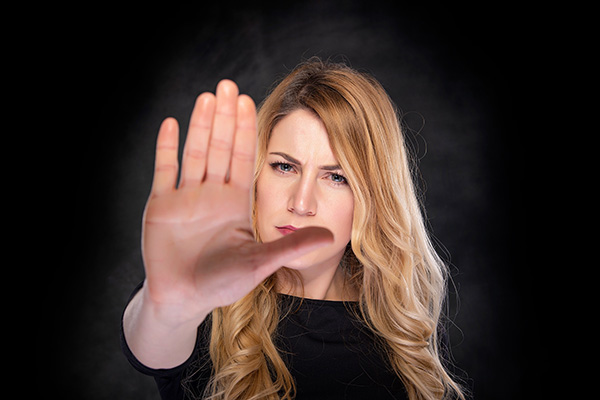guilt
Cutting The Toxic Cords That Bind Us
 In every relationship – romantic, platonic, professional – there is a metaphysical cord of attachment that exhanges energy from one person to the other.
In every relationship – romantic, platonic, professional – there is a metaphysical cord of attachment that exhanges energy from one person to the other.
These energy cords can be thought of as WiFi signals, electrical circuits, or even surgical tubes that transfer mental, emotional, and spiritual energies between individuals. They are the invisible ties of love that keep us connected to our loved ones.
I remember reading an article years ago about the intense grief of famous American singer Dean Martin after the tragic death of his eldest son. His boy was a fighter pilot in the California Air National Guard and lost his life in a plane crash during a training flight in 1987.
Martin described the loss as feeling as if his “heart had been ripped out.” This vivid description is a testament to the reality of these ties that bind us. The intense pain the singer felt was essentially his heart chakra feeling ‘broken.’ The loss had a profound impact on the remainder of his life and career.
The concept of these cords may seem abstract, but their effects are very tangible. They are not just symbolic; they are very real and have a profound effect on our physical, emotional, mental, and spiritual well-being on a daily basis.
When we engage in any kind of relationship with someone, these energetic cords extend from our chakras, or energy centers, to those of the other person. While these soul-to-soul cords feed us with all the good energies that come from being connected to others, such as love, nurturing, and belonging, they can also have the opposite effect.
Reclaim Your Peace And Power With Healthy Boundaries
 Saying “no” is one of the most powerful things we can do to maintain our personal and spiritual well-being and energetic balance.
Saying “no” is one of the most powerful things we can do to maintain our personal and spiritual well-being and energetic balance.
Many of us are caught up in the daily whirlwind of commitments, expectations, and the constant need to meet the demands of others. For those on a spiritual or esoteric path, this can be especially challenging.
The desire to be compassionate and supportive can sometimes blur the lines between compassion and self-neglect. However, one of the most profound spiritual lessons is this: it is okay to say no. In fact, it is imperative!
Knowing when and how to say no is a critical self-care skill that allows you to set healthy boundaries and protect your time, energy, and mental health. Moreover, it is crucial for our spiritual growth and essential for living a life filled with purpose and fulfillment.
Saying no and standing your ground requires recognizing your inherent worth and honoring your personal limits. Too often we stretch ourselves too thin, trying to be all things to all people. This may come from a fear of disappointing others or a belief that our value is in how much we give. Many of us also feel spiritually obligated to be there for others, often because we are so deeply affected by all the struggles and suffering we see in the world around us.
However, when we put the needs of others ahead of our own without balance, we risk depleting our physical, emotional, and spiritual energy. In such a depleted state, we are of no use to anyone.
Forgiving Yourself Is A Spiritual Necessity
 Self-forgiveness is more than just a mental health recommendation – it is a spiritual necessity. It is vital for the spiritually aware person to release guilt, self-blame, and self-criticism, because forgiving oneself is crucial to both personal well-being and spiritual progress. It allows for healing, growth, and the ability to live a more fulfilling and harmonious life.
Self-forgiveness is more than just a mental health recommendation – it is a spiritual necessity. It is vital for the spiritually aware person to release guilt, self-blame, and self-criticism, because forgiving oneself is crucial to both personal well-being and spiritual progress. It allows for healing, growth, and the ability to live a more fulfilling and harmonious life.
Failure to forgive ourselves can have profound personal and spiritual side effects. Carrying guilt and self-blame leads to chronic emotional distress and contributes to anxiety, depression, and low self-esteem. Over time, this can manifest itself in physical symptoms such as headaches, fatigue, or even chronic illness.
A lack of self-forgiveness undermines self-worth and hinders personal growth and development. Difficulty forgiving yourself also strains your relationships with others, as it can lead to withdrawal, defensiveness, or projecting negativity onto those around you. Without forgiveness, our negative feelings toward ourselves can fester and damage even our most cherished relationships with our loved ones and friends.
Holding onto guilt and self-blame blocks the flow of positive energy through the chakras and hinders spiritual well-being. For example, guilt often stagnates in the solar plexus chakra, affecting one’s sense of personal power. Self-forgiveness is essential for clearing such blockages in the energy field.
Forgiveness is also essential to achieving inner peace and harmony. Without it, one can experience constant inner turmoil and restlessness. When we hold onto guilt, shame, or self-blame, parts of our spiritual essence or inner divinity are suppressed or disconnected. It causes separation from one’s spiritual path or a sense of disconnection from spirit and the divine.
The Self-Affirming Power Of Saying No
 Are you the kind of person who has a hard time saying “no,” even when your heart isn’t in it?
Are you the kind of person who has a hard time saying “no,” even when your heart isn’t in it?
Maybe you’re afraid of disappointing others, afraid they’ll distance themselves, or afraid they’ll stop liking you if you say no. Maybe your introverted side just wants to be liked and accepted by everyone, so you agree to things – even if it drains you.
I’ve experienced this myself and seen it happen to many people who come to me and ask, “How can I say no without feeling guilty?” or “If I don’t say yes, will I lose my connection with this person?
Saying “yes” out of fear, guilt, or obligation may be the easy way out in many situations, but it usually comes at a high cost to your personal and spiritual well-being.
Let’s acknowledge something important: You are enough just the way you are, and you are worthy of peace, joy and happiness. If someone truly values you, they’ll respect your boundaries, even if it means saying “no” once in a while.
On the other hand, if people cut you off because you set boundaries, they may not have been the healthiest presence in your life to begin with. True friends and meaningful relationships will respect your choices and understand your reasons without demanding constant explanations.
Over time, I’ve seen the toll that over-commitment takes. People who constantly say “yes” often end up feeling drained, overwhelmed, or even resentful. Some develop physical and mental health problems because they feel trapped by the constant need to please others. In some cases, burnout and depression set in, all because saying no felt like an impossible task.
Forgiveness Is Choosing To Take Back Your Power
 Ah, forgiveness! Such a misunderstood concept. For many people, forgiveness, as noble as it may sound, is very difficult, even impossible.
Ah, forgiveness! Such a misunderstood concept. For many people, forgiveness, as noble as it may sound, is very difficult, even impossible.
Sometimes certain wrongs are so grave to us that the offender doesn’t deserve forgiveness in our eyes. There is also a misconception that forgiving someone is tantamount to excusing or justifying their terrible actions. But forgiveness is not about absolving someone of responsibility. Instead, it is a powerful, personal act of release and healing.
When we forgive someone, whether they’ve hurt us emotionally, betrayed our trust, or even caused us physical harm, we’re not letting them off the hook.
We are not condoning their actions or giving them permission to repeat those offenses. Rather, we are choosing to free ourselves from the weight of resentment, pain, and bitterness that binds us to them and their past actions.
Forgiveness is a gift we give ourselves. It allows us to move forward without the burden of past grievances and with an open heart, free of resentment.
By forgiving, we determine for ourselves that the transgressor’s actions and the memory of their misdeeds will no longer hold us hostage or march with us into the future.
While we may not be responsible for what happened to us in the past, we are responsible for how we choose to carry the memory of it into the future. This is the power of forgiveness: it gives us the strength to embrace our present reality with clarity, compassion, and freedom. It also transforms our future, for it is ultimately a karmic choice that will shape our destiny in ways we will only understand much later in this life and beyond.
Letting Go Of Guilt
 We all like to be seen as good people, and it can be deeply unsettling when others perceive us otherwise. When we find ourselves in a disagreement with a dear friend or colleague and take the blame for something we’re not responsible for, it’s natural to feel unhappy.
We all like to be seen as good people, and it can be deeply unsettling when others perceive us otherwise. When we find ourselves in a disagreement with a dear friend or colleague and take the blame for something we’re not responsible for, it’s natural to feel unhappy.
Spirit teaches that while it’s important to own our actions and the roles we play in conflict, guilt only serves to amplify feelings of remorse. If we allow guilt to fester, we may begin to believe that we are “bad” people who do not deserve happiness and success.
This is far from the truth. We are human, and human beings have the ability to change. Our actions may not always be right, but that doesn’t mean we are inherently bad or deserving of punishment.
Making mistakes is part of being human, and sometimes we need to adjust our responses, especially in challenging situations, in order to grow and improve. Spirit suggests that this is a much healthier perspective.
However, taking this “healthy approach” is often easier said than done. We’ve grown up in a world where elders, peers, and society define what is good and bad – even when they’re not always right. This can lead us to judge ourselves harshly and feel unnecessary guilt.
Many traditional spiritual teachings emphasize the importance of forgiveness, both of oneself and of others. In Christianity, for example, the concept of repentance is central; believers are encouraged to confess their sins, seek divine forgiveness, and then release their guilt, trusting that God’s grace has absolved them.
Do You Know If Your Partner Is Cheating?
 I often have married people call me for insight into whether their spouse is cheating on them. In some cases, I also consult with clients who are having an extramarital affair themselves.
I often have married people call me for insight into whether their spouse is cheating on them. In some cases, I also consult with clients who are having an extramarital affair themselves.
It has become increasingly common for clients to confide in me about their infidelity, revealing that while they are married, they are also dating or having sexual relationships with others outside of their marriage.
One trend I have noticed in recent years is that more women seem to be engaging in infidelity, at least among those who come to me for counseling.
What I often find particularly intriguing is that in many cases people believe, for the wrong reasons, that the person they are having an affair with is more compatible with them than their current spouse.
Despite the morally complex situations in which my clients find themselves, I make it a point not to judge them. My job is to provide the best possible insights and information to help people navigate their circumstances for their highest good; not to question their life choices.
My clients often express their appreciation for my nonjudgmental approach, noting that I don’t lecture or impose my personal opinions. This is a given for me, as it is considered essential and non-negotiable among reputable, ethical psychic advisors. Also, I haven’t walked in their shoes. Life is complex, and none of us are without flaws.